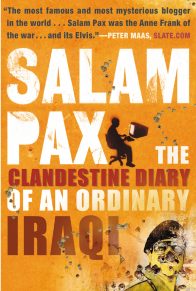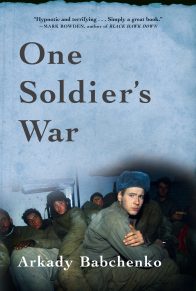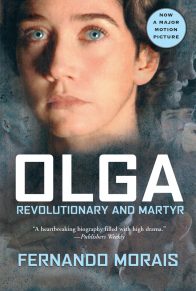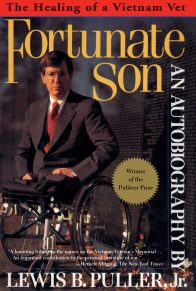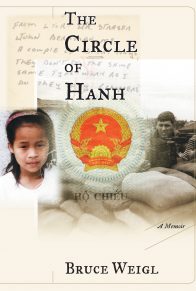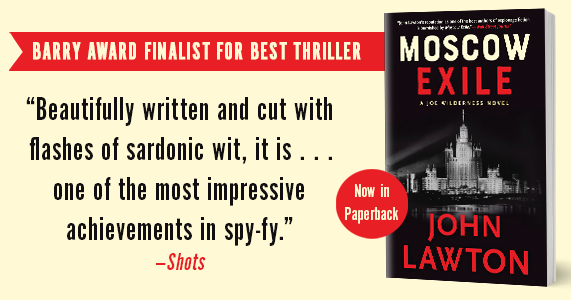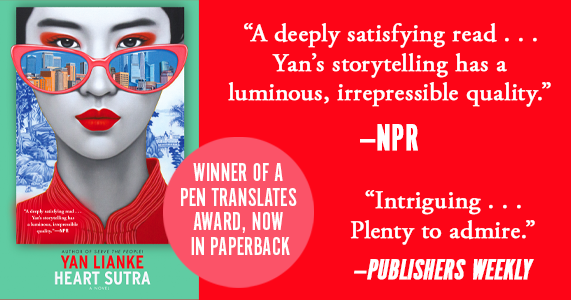I could have used a father’s advice before deciding to join the army. A father could have guided me through my worst hours in Iraq. And by the time I ran away from the American army, I was starving for the counsel of an older man. I wished for a father with two basic qualities: knowledge of war and love of his son. But there was no such man in my life. There was no one at all who fit the bill. Anonymously, I called an army lawyer. His job was to advise soldiers in distress, but the only thing he gave me was an earful. “Soldier,” he said on the telephone, “you’ve got two choices. You get back to Iraq or you go to jail.”
Hanging up the phone, I took comfort in the arms of my wife. Without Brandi, I could never have made it through the hell of living as a fugitive. I was a total mess. I couldn’t sleep. Couldn’t handle crowds. Couldn’t even stand in a supermarket checkout line.
All around me I imagined grenades launching, bullets pinging off concrete, and the heads of decapitated Iraqis accusing me of war crimes. I kept reaching for my weapon—an M-249 squad automatic weapon, thirty-six pounds fully loaded—and felt naked without it.
In Iraq I learned that every soldier has his story. One man who was ripped apart by an explosion in his armored personnel carrier told me, as I picked up his leg and put it beside him on the stretcher, “Now I get to see my daughter.” Others sank under the weight of “Dear John” letters and had no reason at all to go home.
As for my own story, I am not yet thirty but feel as if I have already lived four distinct lives. In my first life, I lived at home in Guthrie, Oklahoma, and then started a family of my own with Brandi. In the second life, I spent eighteen months in military training and at war in Iraq. In the third life, I deserted the U.S. Army and hid in Philadelphia for fourteen months, slinking under the cover of darkness from one cheap hotel to the next. In this current life, I am hanging on in a new land with my wife and children, waiting to see if the Canadian courts will let us stay.
* * *
I was born in 1978 and grew up on a farm on the outskirts of Guthrie, a small town twenty miles north of Oklahoma City. The land was owned by my grandfather Elmer Porter, who bought it after serving in the Korean War. Elmer had been an airplane mechanic at Tinker Air Force Base, but he was retired by the time I came along. He lived on the property with my grandmother Doris Porter. Some aunts, uncles, and cousins of mine had their own houses on the property, and my mother, brother, and I lived in a two-bedroom trailer about two hundred yards from my grandparents’ house. Before heading to school, I would often stop by my grandparents’ bungalow for breakfast. Doris always made me eggs over easy, and Elmer cooked bacon in an iron skillet. My memories of eating with them are the fondest of my childhood. They were the rocks in my life, and I took refuge in their home when it was too hot or too violent in the trailer.
Doris and Elmer were Pentecostal Christians. Elmer said it was wrong for a man to hit his wife. I never saw him raise a finger against anyone. He showed me how to whittle and taught me how to fix motors, pumps, and fences on the farm. He kept ten ancient tractors that he couldn’t bear to part with. Every spring, while I held his tools, he would tune them all up and drive each one around the property.
When I was thirteen or so, my grandfather said there was no room on the farm for seven new puppies. He had a quick death in mind. It was nothing to him—nothing more than avoiding a situation where he would have to feed too many dogs. I knew he didn’t mean to be cruel, and I suspect he thought that with his sharp blows to the head he was bringing them an instant and painless death. But I had seen his solution before and just couldn’t stand by and watch him take a hammer yet again and kill the puppies that way. So I dug one big hole in the woods behind my trailer, spread the puppies out on the ground, aimed my .22 rifle, and shot them each once at point-blank range, hoping to spare them the misery of my grandfather’s hammer. I covered the pups with dirt, stood up with the shovel, took a step back, and could hear two of them still weeping under the ground. I dug them up in a panic. Two of them were barely moving, but they were still whimpering. I knew they were suffering and I didn’t like to see anything suffer. I choked back the realization that I had just caused them more pain than my grandfather would have done with his own technique. I ran back to the trailer as fast as I could, opened the unlocked gun cabinet, and scoured the shelves for a weapon I knew would be loaded already and much more powerful. I grabbed a silver nine-millimeter Ruger pistol and ran back to the hole. I shot every round from the gun—I believe it was thirteen bullets—into the bodies below. My lungs were heaving, and my body was racked with sobs, and I shot indiscriminately until I knew for sure that all the puppies were dead. I didn’t speak to a single person about what I had done, and for weeks I was haunted by the killing of the weeping dogs.
My grandmother Doris smoked Virginia Slims and was always crocheting, sewing, or knitting. She watched Walker, Texas Ranger every day on TV. She used to make pecan pies and let me eat them warm. On nights when it wasn’t safe in the trailer, I slept near my grandmother in her bedroom. Doris was religious, but she swore like a trooper. She was reliable on one hand and easygoing on the other, and I loved my grandmother more than anyone else in the world.
The day before I flew from Fort Carson to Kuwait, I called Doris on the telephone. I told her that I would think of her every day while I was overseas and asked what she was doing that day.
“I’m covering all the house windows with plastic,” she said.
I chuckled. “Grandma, what’s all that foolishness about?”
“In case of chemical attack,” she said. “Half the folks in Guthrie are doing the same thing. People say we might get chemical attacked, so they’re covering up their windows.”
I laughed out loud. I wished I could be there to hug the woman and fix her a glass of iced tea.
“Grandma, you ought to sit down and relax. Forget covering the windows. Plastic won’t help you if we get chemical attacked. If that happens, you might as well just bend over and kiss your ass good-bye because we’re all gonna die.”
She laughed and said it was probably true. She said that I should take good care of myself, and that she would always love me. I never heard her voice again. Doris died seventeen days after I flew into war.
When I was still a teenager, my father almost came back for me. His name was Donald Ernest Key. I knew little about him. He had three sons from an earlier marriage, but I’ve met them only once. He was a welder and he drank too much. He took off when I was three and never paid my mother a cent of child support or alimony. The next time I saw him was twelve years later, when he was lying in his casket. I heard that he had died in an accident while working on an oil rig off the coast of Africa. I was told not to go to his funeral, because he had remarried and his relatives might think I was chasing his money. So I didn’t go to the funeral but I went to the visitation. I spoke with his sister, who said she had heard that Dad had recently come to see me. That seemed a strange thing to say, since I had never seen or heard from him. A little later, I wandered through the woods on our property and came across a beaten-up old lawn chair in a grove of trees. Empty liquor bottles were strewn around the chair. Peering through the growth I could see my own yard. I assumed that my father had hidden himself there to watch me coming and going on school days. Who else would have been hiding in the woods on our family farm, south of Guthrie, emptying bottle after bottle of Wild Turkey? It sure wasn’t my stepfather, J. W. Barker, who kept his own beer locked up in a refrigerator in his bedroom. My father was said to be a fine welder, but he never found the courage to speak to me.
My mother’s name is Judy Porter. She is fifty and lives in Guthrie. She has heart trouble and a pacemaker and uses an oxygen tank to breathe. I speak to her almost every day by telephone but haven’t been able to see her since I went AWOL four years ago. Most deserters get caught, and they get caught being stupid. They just can’t resist the urge to visit their loved ones. It was fortunate that Brandi and the children came with me the moment I went into hiding. And it was a good thing I never went back to see my mother. The military police would have caught me for sure. Mom told me that after my desertion she saw strange cars parked down the road. Even Captain Bower, my commanding officer in Iraq, called my mother on the telephone. Bower told her that a number of soldiers had deserted his company of 120 men, and that he had caught every last one of them except for me. He warned that she could be charged if she helped me in any way. “Aiding and abetting a criminal is against the law” is the way Mom said he put it.
Here is how I avoided detection: by following every word of training that I received in the army. When your job is to defuse land mines and to set plastic explosives on people’s doors before busting into their homes, you either pay attention to details or die with your head up your ass. After I went AWOL, there was one detail I never forgot: If you don’t want to get caught, don’t go see your mother.
Unlike the men who walked in and out of my life, my mother did not have a drinking problem. However, by the time I was in high school she rarely got out of bed or left the house. She never went to meet my teachers. She never drove to a football game to cheer me on. She hardly went anywhere at all. Looking back, I think she was depressed because she had married a string of alcoholics. Earlier, when she was healthier, she served coffee and meals at a local truck stop on the road to Oklahoma City. When I was nine, a trucker named James Willard Barker moved in with my mother and became my third stepdad. He stayed eleven years with my mother before he finally left.
I can credit J.W. with one thing: he did such awful things to my mother that I learned the hard way how not to act. Nobody deserves the kind of treatment J.W. dished out. J.W. intimidated and dominated my mother, my younger brother, and me. His reign of terror lasted until two things happened around the same time: I finally outgrew him and he developed cirrhosis of the liver.
When I was a young boy, I doted for years on a black, brown, and white weenie dog with a ridiculously long tail. His name was Buttercup and he slept in my bedroom. Not long after J.W. moved in, he made me put Buttercup outside on a cold winter night. I begged my mom to let me bring Buttercup in from the freezing weather, but she said that I had to obey my stepfather. The next day, I searched everywhere but couldn’t find my dachshund. Two days later I found Buttercup huddled under the trailer, frozen to death.
J.W. got rid of my mother’s animals too. She had been keeping horses, goats, and chickens for years, but J.W. sold every one of them off. Drinking money, I supposed.
It didn’t take long before I hated him and wished for his death. A short, muscular man who wore a cowboy hat and cowboy boots, J.W. kept dozens of loaded weapons in unlocked cases in the trailer. I learned how to use them all.
On my ninth birthday, as a lark while his drinking buddies looked on, J.W. let me hold his nickel-plated .357 Magnum pistol.
“Go ahead,” he said, “see how it feels. Pull the trigger. It’s not loaded.”
When I pulled the trigger, a bullet exploded from the barrel. The gun flew up and rocked my shoulder, nearly knocking me over. Witnessing my humiliation, J.W. and his buddies bent over in laughter.
I already knew how to shoot a .22 rifle before J.W. came into my life, but under his watch I learned to clean, load, and shoot every weapon in his collection. In the field behind our trailer I shot pistols, shotguns, and rifles. By the age of twelve, I was shooting M-14 and AK-47 assault rifles.
Someone gave me an Uzi around that time, and I used it to shoot snapping turtles in the pond near our farm. When I hit them, the turtles would fly up in the air and land on their backs in the water. I had a mortal fear of snakes, and one day I spotted a large one wrapped around a tree. I ran home, loaded a twelve-gauge pump-action shotgun, raced back to the tree, and blasted the sucker over and over. My grandfather, who had seen me while working outside, teased me about it for a long time. “Did you need all those rounds for just one snake?” he asked.
I began to hunt at the age of nine or ten. I didn’t need a permit because I was underage. On a hunting trip a few years later, I spotted a deer two hundred yards away. Aiming a Remington seven-millimeter rifle with a scope, I shot a four-inch bullet into its neck. I felt a rush of adrenaline. When I ran up to take a closer look, I found blood everywhere. It was shocking to me. I felt horrible. The animal seemed big-eyed and defenseless, its life utterly wasted. J.W. made me help as he hung the deer from a branch and gutted it. Blood and guts spilled over our hands and arms, but we had to keep moving so the meat wouldn’t spoil. It didn’t matter that we ate the meat, or that it tasted good. My first deer became my last, and I did not go hunting again.
J.W. was obsessed with guns, but everybody else in the family had them too. My mother kept one by the side of her bed, and to this day my eighty-year-old grandfather packs a pistol in his pocket.
Twice in my thirteenth year I nearly shot J.W. The first time, J.W. gave me a .410 shotgun and told me to put it away in the gun cabinet. To check if it was loaded, I pointed it at the window and pulled the trigger. When the shotgun blasted, some pellets hit the fireplace and others shattered the window. I missed J.W. by about an inch. He screamed and hollered about how I was a fat, stupid, dumb-assed retard.
The second time, I heard our trailer door open in the middle of the night. I reached for my twenty-gauge shotgun, which I kept with rounds of ammunition in the bedroom that I shared with my brother, Tyler. I picked up the gun and stepped out into the corridor, pointing it forward. At the same moment, J.W. stepped out into the hall with his AK-47 pointed at me. The door had merely blown open in the wind. We saw each other just in time, lowered our weapons, and returned to our bedrooms.
Gun accidents weren’t uncommon in my world. J.W. had a daughter from a previous marriage, and she had a son named Nathan. For his fourteenth birthday, Nathan received a handgun from J.W. Later, Nathan played with it in his bedroom. While looking at the barrel he pulled the trigger and blew his head off. Everybody said it was an accident. And in high school, I had a seventeen-year-old friend named Chris Coleman who died at a party when someone put a nine-millimeter pistol to his head and pulled the trigger. Then too, the kids at the party assumed it was not loaded.
J.W. bossed me around and called me stupid and fat all the time, but he reserved the very worst for my mother. When J.W. got drunk, something evil came over him, and he went looking for her.
Once, Mom got up from the dinner table and opened the dishwasher to reach for a plate. Without provocation, J.W. swept up behind her, grabbed the dishwasher door, and slammed it shut against her hand. Mom let out a scream and went to hide in her room. She never wanted us to see her when she was in pain. Mom went to the doctor a few days later, claimed she had fallen down some stairs, and came home in a cast. I wished that the doctor had paid a house call. Surely he would have seen that there were no stairs in our trailer. Maybe he would have demanded another explanation for the broken hand.
Another time, J.W. loaded Tyler and me into his car and raced up to the highway restaurant where Mom was working. As soon as he barged through the door he began shouting that Mom had been sleeping with other men.
Mom stared at him, eyes wide. “Are you crazy?” she said. “Go away. I’m working.”
But J.W. would not stop shouting. Finally, the boss came out and told my mom to leave. She lost her job. Mom drove back home in another car, and I rode with her while she cried and said she had no idea what J.W. had been talking about. I remember seeing him punch her when we got back home. After that, my mother stayed in bed most of the time, depressed and unable to do anything for herself or for us.
I wasn’t yet eleven.
After Mom lost her job, the troubles continued. Alone in our bedroom, Tyler and I could feel the trailer shaking. We knew it was Mom, being thrown against the walls. I looked out through a crack in the door and saw J.W. rip a phone off the wall and use it to smash my mother in the head. I came out of my room and saw blood running from her ear. J.W. hollered at me to get back and to close the door behind me. Mom, too, pleaded with me to stay out of it. She went to the hospital and came home with a bandage like a turban around her head. J.W. had broken her eardrum.
Sometimes in the morning I would notice a scratch or a bruise on J.W.’s face. That would make me light up in a moment of private victory. The battle scars meant that my mother had managed to scratch or punch back at least once during the beating. I could not understand why she wouldn’t leave him, and I could not believe that his brothers would just sit around and drink beer and watch without a word of protest when J.W. beat my mother.
I wonder if seeing my mother get beaten up so many times led me to feel, in the end, that it was only normal that I, too, should have a few knocks in life. When I was sixteen, I began my first part-time job. A few evenings a week, I worked in the Kentucky Fried Chicken outlet in Guthrie for about $5 an hour. One day, while I was changing an oil filter on a deep fryer, I accidentally placed my hand in vegetable oil that was boiling in a vat. The grease exploded against my face and one hand. I jumped back and leaned over a sink to throw water over my face and hand. I could feel that I had been seriously burned, so I asked the manager to call an ambulance. She was busy serving customers and refused to help me. I ran out the back door to my truck to drive myself to the hospital. The truck had a flat tire. With blistering hands and a face that felt like it was on fire, I had to change the flat before I could jump behind the steering wheel and drive with my third-degree burns to the hospital. I never returned to work at Kentucky Fried Chicken, but I didn’t stop to think that I deserved better treatment and never even thought about making a complaint.
Somehow, I survived my childhood. Perhaps it helped to feel normal and to know that other people had it much worse. Maybe they didn’t have enough food to eat. Maybe their loved ones were sitting in prison. Maybe a man named Timothy McVeigh had just blown up their folks in Oklahoma City. It was probably just as well that I didn’t know that my own life was difficult.
I wouldn’t wish my childhood on anyone, and I want to protect my own children from a life like mine. But I will say one thing for it: learning to cope day after day with harshness gave me the strength to push through the nightmare in Iraq and the stubbornness to find a way out. Perhaps my childhood outrage rekindled after some months in Iraq and made it possible for me to do the one thing a soldier must never do: think for myself and question my commanders.
The Oklahoma summers were hotter than hell. My brother and cousins and I would make mud pies and watch them dry out in the sun. It never took long in 115 degree heat. My cousins liked to swim in the pond, but I mostly stayed out of the water because I lived in fear of cottonmouth snakes. We dug pretend war tunnels underground and shot paint balls at one another until, at thirteen, we graduated to whiskey and beer and racing down country roads in pickup trucks.
We called the spring “beer-drinking weather,” and early on we found two more ways to amuse ourselves. After drinking late into the night we would go out cow-tipping in farmers’ fields. Cows fall asleep standing on their feet, and we would sneak up and knock them over real fast. They had no balance at all and would topple like bowling pins. Farmers didn’t like our pranks, and we had to clear out as fast as we could before someone caught sight of our license plates.
Our second amusement was mailbox crashing. A friend and I would go tearing down the road in my 1992 Nissan pickup. While he drove, I leaned out the side window with a baseball bat, swinging at the country mailboxes. You can get in a decent pop at thirty miles an hour.
Three miles down the road lived my junior high school shop teacher. Mr. Smith was a heavyset man with gray hair and Coke-bottle eyeglasses. He wasn’t a bad teacher, but he had an irresistible mailbox. Each time I smashed up his mailbox he put in a new one. Finally, he installed a rubber mailbox. The baseball bat didn’t do any good, so I—using a recipe from The Anarchist Cookbook—cooked up homemade napalm on my friend’s kitchen stove, carried it in an old paint can, and poured it all over the mailbox, which melted. Once more, my shop teacher couldn’t get his letters delivered.
Some of the men in my life—my grandfather and J.W. in particular—had a lot of prejudices about blacks and Asians. One time, I was working in a doughnut store run by one of my aunts and my grandfather happened to be there when a number of black college students walked through the door. I was mortified to hear him mumble aloud about how he wished the Ku Klux Klan would come back. I noticed one of the students giving him a withering look, as if to say, “You are one pathetic loser.” I was relieved that he and his buddies got out the door without incident and—even though I loved my grandfather deeply—resolved not to be like him in that respect. I brought black friends by the house, and kept doing it even after he asked me to stop. “Grandpa, you’ve got to get out of the 1950s,” I would tell him. “It’s the 1990s now.”
I think that the fear of the unknown—blacks and Asians, in this case—led my grandfather to hold those prejudices, and I would say that the very same fears made it easy for too many American soldiers—myself included—to abuse Iraqi civilians. In our training, our commanders taught us to demonize and hate Iraqis and Muslims. Looking back, I am sorry to admit that some of the negative parts of my own upbringing climbed from the darkness of my soul and shook hands, in a way, with my army training. It took some time in Iraq before I could put the hateful thoughts behind me.
During my childhood in Guthrie, folks used to say that one day there would be another war between the North and the South. People sometimes wish they could bring back the past, but I don’t think they truly want war in their own backyards. If they had any idea of what war meant—if they could picture blood spilling from white, black, or any other bodies—I am quite sure they wouldn’t want it. I learned this the hard way, at war in Iraq. The first time an innocent civilian died before my eyes, I didn’t ask myself questions about her racial or ethnic background. The only question to ask was why she had to die in the first place. When I look back at my childhood in Guthrie, I think all the talk about bringing back another war between the North and the South was just a way to let out hot air, and no more than an ignorant way to shoot the breeze. I think that deep down all such people really wanted was to pass the time by watching—or joining in—an old-fashioned fistfight. The summers were hot and god-awful boring, and there wasn’t much to do in Guthrie except get drunk and start fighting. In that respect, I quickly became a model citizen.
I got in my first fight when I was eight. A thirteen-year-old boy started picking on a kid in my grade, so I kicked the bully in the face. He was a foot taller and a whole lot bigger. He blacked both of my eyes and busted my lip. I had another stepdad back then, and I feared that I would get a whupping for coming home beaten in a fight. I had been at a football game, and when my stepdad came to pick me up I pointed out the boy I had fought. My stepdad noticed the size of the older boy and said I had done enough for the day.
I fought through junior high and kept fighting in high school. I fought black kids and I fought white. I even fought teammates on my football team. I fought so many times that my jaw still locks up on occasion from having taken so many punches.
When I was about seventeen, I got arrested for taking a swing at a police officer who tried to stop me from going to help my mother during a forest fire. My grandmother nearly got herself charged for barging into the police station, swearing at all the officers, and demanding my release.
In court, the judge suspended the charges when he heard that the police officer had ganged up with other cops and roughed me up. My only requirement was to attend a few classes on anger management. I took the classes with two men who had gotten into all sorts of trouble. One of them had beaten up his ex-wife’s boyfriend. Not long after the anger management instruction ended, I discovered the two classmates yet again pounding the snot out of the exwife’s boyfriend. At the time, I thought that anger management was a bit of a joke. Looking back, however, I think that everybody would have been better off if a few soldiers I know had been sent to anger management class instead of Iraq.
* * *
These days, Brandi and I don’t let our children play with toy guns. I see the irony in that. Zackary, our eldest, is nine years old. When I was his age, one of my favorite pastimes was to stand alone in the backyard, blasting apart beer bottles with a .22 rifle. Because he’d come from another country, had an American accent, and took some time fitting into his new Canadian school, Zackary became the target of a bully. One of my biggest challenges as a father was not to tell him to cock his arm and slug the bully in the mouth. But I know that Zackary will do better things in life and that the world will be a better place if he learns to use words to solve his problems.
My first experience with terrorism was in my home state of Oklahoma, and I know that 168 lives would not have been lost if a man named Timothy McVeigh had been taught to use words instead of force. In 1995, when the ex-soldier and war veteran blew up the federal building in Oklahoma City, we felt the blast in our high school some twenty miles away. McVeigh used a truckload of ammonium nitrate—cow shit fertilizer, basically—to kill all those people, including nineteen children. A boy in my school lost his dad in the explosion, and a girl lost both of her parents. Before the explosion, some of the kids in school had teased this girl about coming from a poor family. The teasing stopped after the explosion. I had no idea what to say to a person who had lost both her parents, so I just felt sorry for her and said nothing at all. Classes were canceled as soon as we got the news. We assembled in school for the rest of the day to watch the television reports. Within forty-eight hours, the police had charged Timothy McVeigh with blowing up the building. I couldn’t believe it. I had figured it was the work of a foreign terrorist. But it was an American—a former gunnery sergeant in the 1st Infantry Division in the Persian Gulf War—who had blown up his own people.
When I started going out with Brandi, she knew that I had gotten into my share of fights down by the Cimarron River, but her background was just as rough as mine. She had plenty of fights under her own belt and had also been warned that she’d face consequences at home if she lost a fight in the streets. I told her I had seen my mother get beaten too much, and that I would never beat a woman. She liked that about me. She liked everything about me. She was so like me that there was barely anything that needed explanation. We were both poor, had grown up with way too much violence in our family lives, and wanted to put the worst of our lives behind us. I knew, within five seconds of meeting her, that she wanted to be a good person and to lead a good life. I believe she felt the same way about me.
Brandi and I were both eighteen when we met. I was still in twelfth grade but she had already graduated from high school and was working in a dollar store. The day after we met, I stopped by the store to ask her out to dinner. She accepted the date but persuaded me to forget the restaurant and settle on fast food. Why waste money when we could park the pickup by a quiet creek, talk, look out at the water, and let the night grow late?
Brandi liked my mother, but she could read J.W. like a book. She knew the score. When Brandi was three her mother was murdered. At the time, her father had been doing a seven-year jail term. J.W. tried to tell Brandi and me what we could and couldn’t do in bed, but we didn’t listen to him. It wasn’t his trailer anyway, it was my mother’s. To hell with his instructions that Brandi sleep on one side of a bedsheet and that I sleep on the other.
Although I tried to have as little as possible to do with J.W., I liked his father a little better. His name was Bill Church, and he had fought in the Korean War. He had been sprayed with tear gas in Korea and lost an eye. I tried to ask him about Korea, but he never wanted to talk about it. The last time I spoke to him was just before leaving for Iraq. He cried to hear the news that I was going to war. He said he understood that I had to go but warned me to be careful.
I have seventeen cousins and various aunts and uncles and Brandi has relatives too, but we have hardly spoken to any of them since I deserted the army. With the exception of my mother and my brother, most of them are scandalized by what we have done. I believe they fear they’ll have trouble with the law if they talk to us, and so have written us out of the family. Brandi and I lost more than just our country when we came with our children across the border at Niagara Falls, New York. We lost our families too.
* * *
Brandi and I agree that it was love at first sight. We were inseparable from the day we met. Within two weeks we made plans to get married. We wanted to have a decent wedding, but we couldn’t save enough to pay for it.
Brandi and I took an apartment together after I graduated from high school. We worked at every imaginable kind of job. Wherever we went, Brandi worked as a waitress and I held down jobs as a welder, general laborer, roofer, cook, salesperson, or pizza delivery man. I usually made about $7 or $8 an hour. We moved all the time in search of better jobs and better pay. When things got too hard in Guthrie, we tried our luck in Oklahoma City. Then we tried Madison, Wisconsin. And then we moved back to Oklahoma City.
Zackary, the first of our children, arrived in 1998 when we were both twenty. In February 1999, Brandi and I gave up on our dreams for a family wedding and eloped to Arkansas. We were married by a justice of the peace. We had a crowd of four: Zackary, Brandi’s sister, and her father and stepmother. Brandi’s folks took care of Zackary during our one-night honeymoon. We stayed in a hotel in Muskogee, Oklahoma, and ordered in pizza for dinner.
By the time Adam came along in October 1999, Brandi and I were finding it hard to live on her tips and my salary. Changing cities and jobs never led to better pay. I picked up some welding work on a few of the jobs but got no formal training. To cut down on costs, we bought clothes at secondhand stores and stayed in run-down apartments. Our place in Oklahoma City had holes in the floor and in the windows. The water didn’t run and the toilet didn’t work. The place didn’t even have a stove. Brandi had to go to her grandmother’s home to cook for us.
Brandi had Oklahoma state health insurance for herself and our children, but I had no health insurance. One day, I felt stabbing pains in my back and started urinating blood. I drove to a hospital in Oklahoma City, but they turned me down because I had no insurance. The next hospital I tried let me in and X-rayed the kidney stone but couldn’t get it out. In that first of four hospital visits for kidney stone problems I was billed more than $2,000. I couldn’t pay it. Our debts piled up while our credit rating sank. I still have the stone in me and it still acts up.
By the year 2000, when we were both twenty-two, Brandi and I had become desperate. With two young boys, we didn’t even have money to see the dentist. Our families were too poor to help much, but Brandi’s grandmother sometimes gave us food. We never had as much as $50 in the bank. When we were living in Wisconsin, Brandi and I started talking about the military as a way to get out of poverty. I tried to enlist in the U.S. Marines, but they turned me down because I had two children and too many debts.
Brandi and I managed to keep going. By 2002 we were back in Oklahoma City. Brandi was looking after Zackary and Adam, and Philip—our third child—was on the way. I had a job delivering pizza and was allowed to take home as much as I wanted for dinner. We got sick of pizza awfully fast. I decided to try my luck once more with the military. This time I would try the army. Maybe their standards wouldn’t be as high. In March, I drove to the U.S. Army recruiting station in Moore, Oklahoma. At last, I found some good luck. Or so I thought.





